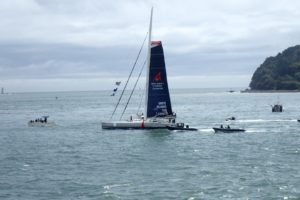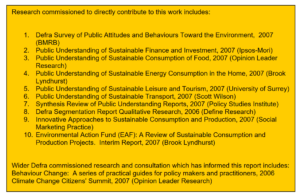To make change happen, we need to understand what motivates people to act. Today we hear from Pamela Buchan, PhD student with the University of Exeter who is studying Marine Citizenship.

Words by Pamela Buchan, PhD researcher at University of Exeter and elected councillor with Plymouth City Council.
There is a new environmental movement sweeping the world, spearheaded by Greta Thunberg, and carried forward by young people who are demanding a better future. Climate change concern in the UK is polling higher than it ever has before, and even the British government has caught wind of the desire to reduce plastic consumption. The global climate strike saw 7.6 million people around the world take to the streets. People are protesting, signing petitions, switching to electric vehicles, changing their behaviours, and making more sustainable choices to create cleaner seas and a sustainable future for everyone. This is environmental citizenship in action.


For three years I’ve been investigating the idea of marine citizenship in a bid to better understand what drives people to become active marine citizens, what it is about the sea that is particularly motivating, and how do policies and legislation work to promote or hinder marine citizenship actions. Actions that benefit the marine environment are likely to benefit the climate also, and this might be a gateway to broader environmental citizenship. As someone who grew up in the middle of the moors with little access to the sea, it was the desire to be near the sea that first took me to Newcastle University to study marine biology and later relocate with my family to Plymouth to benefit from the ocean culture in this city and region. For me, it’s all about the sea, but what about others who are active in marine environmentalism? Does the sea as a place occupy others’ hearts in the same way?

Research around creating environmental citizens is often focused on environmental education and awareness raising. If people understand, are aware, and know what to do, then they’ll crack on and do it, right? This leads to lots of research investigating the perceptions, attitudes, and knowledge held by the general public, which then provides the basis of programmes to increase pro-environmental behaviours. See, for example, the list of research informing the DEFRA Framework for Pro-Environmental Behaviours, which probably explains why the goal for reaching the “unengaged and unwilling” is to: “encourage and support more sustainable behaviours through a mix of labelling, incentive and reward, infrastructure provision and capacity building (e.g. through information, education and skills).” (Emphasis mine.)

Undoubtedly, knowing effective ways to act is an important part of environmental citizenship but clearly it is not the whole solution. If we only ask questions about what people know, then we will only find answers that relate to knowledge. And despite many attempts at environmental education, carbon emissions continue to rise, oceans continue to be exploited and polluted, and even littering and flytipping seem to be on the increase. Knowledge isn’t changing people’s behaviours towards the environment so we need to look more deeply and holistically for other factors.
One field to turn to is environmental psychology and theories around values and identities. Social psychologist, Susan Clayton, has developed a theory that environmental activists share an environmental identity. Other researchers have argued that environmentalism is based on self-transcendent values, such as benevolence and universalism (e.g. Stern et al. 1999 and many since). We must acknowledge that not all people hold strong environmental identities or altruistic values, yet there is a lack of evidence exploring how different kinds of people can be motivated into environmental citizenship. If we are to tackle the environmental problems of today, we need at the very least for all people to be open to policy changes.

My PhD[1] seeks to fill this gap, specifically for marine citizenship. I set out to create space in my research design that would accommodate all findings relevant to this idea. Though my research design draws on theories from environmental psychology, human geography, and environmental law, my use of mixed methods allows me to piece together these theories with emergent findings. In my research, I surveyed, interviewed and shadowed active marine citizens, using psychological metrics and open ended interviews side by side. I found my population through case study marine groups and the national citizen science programme Capturing Our Coast and, using my survey data, I purposefully selected as broad a range of interview participants as I could. Selecting respondents with low self-transcendent values, higher self-enhancing values, a wide range of demographic variables, and as wide a range of relationships with place as was possible from the survey population.
My goal was to find the stories of people who are different. How do people who don’t fit the existing research models come to be active marine citizens? In my final year, I am still analysing my data and pulling it all together, but I have some surprising and tantalising headline findings emerging. The data has been telling me that marine citizenship is not so much a set of pro-marine environmental behaviours, but rather such behaviours are an expression of a marine identity. This marine identity is triggered, developed, or maintained, through sensory experience of the sea that promotes attachment and dependency. It seems that for marine citizens, as with myself, it is the sea itself which motivates citizenship. But there is diversity in marine identity, with people’s values shaping their motivations and types of actions they participate in. It does seem that people with a range of value sets can and do become active marine citizens via their connection to the sea.
There is already research showing that aligning climate change messaging towards specific values will encourage concern in those who are previously unconcerned (see for example Myers et al., 2012). My research points to the potential of the sea as a means of public engagement, which is arguably exemplified in real time through the ‘Blue Planet effect’ in which people have been spurred to reduce single-use plastics. If the experiential qualities of the sea can help people develop a marine identity and, from that, a willingness to perform pro-marine environmental behaviours, then it may be a valuable pathway towards improved ocean and climate health.

[1] ESRC funded on the interdisciplinary Environment, Energy and Resilience pathway, now known as Sustainable Futures
Further reading:
Read more about the psychological aspects of marine citizenship in my paper Citizens of the Sea: defining marine citizenship, delivered at the International Conference on Environmental Psychology, 2019.
I’ll be presenting on my PhD research at the Coastal Futures conference in London in January 2020.
#ExeterMarine is an interdisciplinary group of marine related researchers with capabilities across the scientific, biological, medical, engineering, humanities and social science fields.
Find us on: Facebook : Twitter : Instagram : LinkedIn
If you are interested in working with our researchers or students, contact Michael Hanley or visit our website!
